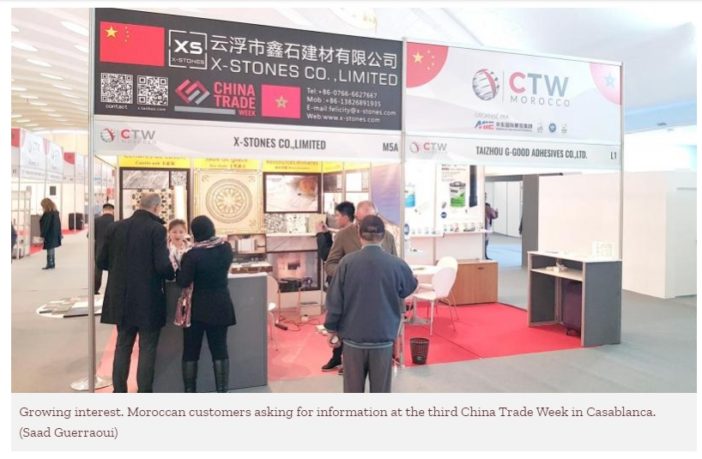The Arab Weekly
Saad Guerraoui
More than 150 – Chinese exhibitors representing agriculture, renewable energy, construction and the tea industry took part in the 3-day fair.
More than 150 Chinese exhibitors representing agriculture, renewable energy, construction and the tea industry took part in the 3-day fair.
“Morocco-China trade relations grew stronger over the past few years,” said MIE Group CEO David Wang at the opening ceremony. “We are very grateful to Morocco for its perpetual support for the Belt and Road Initiative. Morocco is an important hub for trade between China and Africa.”
Ahmed Zahoor, MIE Group vice-president of strategies and partnerships, said China Trade Week (CTW) brought together Moroccan and African professionals in the digital landscape, as well as business leaders who aim to contribute to the digital transformation of the African market.
“The CTW Morocco platform embodies the historic Sino-Moroccan relationship that dates back more than 60 years, making China the third-largest trading partner of Morocco,” said Zahoor.
Jing Ning, the economic and commercial adviser at the Chinese Embassy in Rabat, said the objective of the Belt and Road initiative was to bring together the cultures of the countries.
“We are proud of the development experienced by the ties of Sino-Moroccan friendship and cooperation and we encourage Chinese companies, which offer products adapted to the Moroccan market, to come to Morocco to establish new partnerships,” said Ning.
Chinese investors expressed optimism about the potential of the Moroccan market because of its geographical location and measures implemented by Rabat, including agreements on China’s Belt and Road Initiative, visa waivers and the creation of a trade zone in Fez.
A large part of these measures was taken after Moroccan King Mohammed VI’s visit to China in 2016 during which some 15 conventions, totalling hundreds of millions of dollars, were signed between major Chinese and Moroccan firms.
The event was an opportunity for Moroccan entrepreneurs to look for business deals with Chinese firms. “This is our first participation in the trade fair. Our company is going global and seeking business opportunities in Morocco,” said Wang Kun, deputy general manager of Longitech Smart Energy Company.
“We sell all sorts of renewable energy equipment. Morocco has a great potential in terms of sunlight as electricity bills here are quite high.”
Ruby Yang, sales manager of Hunan Tea Group Company, knows the Moroccan market well because she has been dealing with it for nine years.
“We have been exporting Chinese tea and gunpowder since 2010 to Morocco. Morocco is the number one importer of China’s green tea in the world. We are looking to expand our business in such an important market,” Yang said.
In 2018, Moroccans consumed almost 78,000 tonnes of Chinese tea, nearly one-quarter of China’s total exports.
New standards regulating the tea imported from China went into effect in July following a report by the National Office for Food and Safety, which warned that some Chinese tea brands sold in Morocco contained traces of pesticides exceeding official limits.
Yang said her company was in line with Moroccan customs regulations.
Trade between Morocco and China has increased the past two decades from $1.7 billion to $5.4 billion in 2018, official statistics show.

Written BySaad Guerraoui
Saad Guerraoui is a regular contributor to The Arab Weekly on Maghreb issues.







